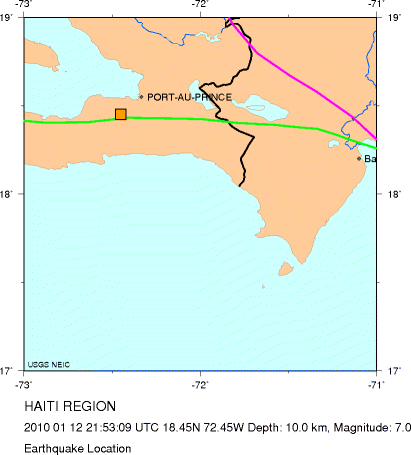
Posted on 01/17/2010 2:37:31 AM PST by ErnstStavroBlofeld
The devastating magnitude 7.0 quake that ripped through Haiti Tuesday, reportedly killing thousands, did not catch everyone by surprise.
In an interview last week for an unrelated story, Robert Yeats, a professor emeritus in geoscience at Oregon State University in Corvallis and co-author of a June 1989 article for Scientific American "Hidden Earthquakes," said that an imminent big west coast earthquake concerned him far less than a "big one" that might occur in Haiti, due to the large fault near the capital city of Port-au-Prince—and the poverty-driven low level of earthquake-preparedness there.
"If they have an earthquake on this fault that runs through Port-au-Prince," the death toll would be tremendous, he said January 6.
The fault, called the Enriquillo-Plaintain Garden Fault, runs some 16 kilometers from Port-au-Prince and is at the intersection of the North American and Caribbean tectonic plates, which are slowly sliding past one another. This movement creates a strike-slip fault, the same kind as the San Andreas Fault in California, where the North American and Pacific plates are sliding in different directions. And like the San Andreas, the Enriquillo-Plaintain Garden Fault has been building up pressure.
"The fault has been more or less locked for 200 years," British Geological Survey seismologist Roger Musson explained to TIME. In this area, where the Caribbean plate is moving east against the North American Plate, plate movement is about seven millimeters per year, the U.S. Geological Survey (USGS) said.
(Excerpt) Read more at scientificamerican.com ...

amazing!!!
Not really.
If you had interviewed 100 seismologists, odds are very hign that one of them might mention this area.
But it’s been quiet for along time.
And if the quake had happened twenty miles further west, it would be a blip on the map and very few would have even paid attention.
This was Haiti’s version of 1906 San Francisco.
Seriously though, I wonder what other faults (apart from the obvious one in SF) have also been slowly building up pressure?
New Madrid
Madrid
Thanks, nice link. It’s bookmarked for study after church this AM. I used to live in western KY and still have extended family in the area. I worry constantly about this fault. It’s been 199 years since the last big one.
I live in NE TX. I always have been under the impression that we could be affected, too, but not on those maps.
“I wonder what other faults (apart from the obvious one in SF) have also been slowly building up pressure?”
Tehran, in the same SA article. Turkey, Pakistan, as well as California..
New Madrid. It’s famous. It rang church bells in the Northeast and was felt along the St. Laurence River.
You’d think they could have spent at least a little of that $3 Billion on some re-bar.......
So tell me just what has your worry accomplished so far? Do you think there is anything you can do to prevent it? What you need to do, instead of worrying, is to be ready for an EQ, have emergency rations stored(including water), clothing, make sure your dwelling is up to EQ code, at least at best as possible. Once these things are done(which they should be by most people for any type of disaster)then worry is just non-productive and useless.
great link, thank you.
More like poverty due to corruption.
It's global warming! I know it's global warming that caused it, because Danny Glover said so!

Actually, there are LOTS of faults running throughout many countries, and though the quakes and volcanic activities are very few and far between, just one is enough to ruin your whole day. A really good example is for those people (like myself) in the midwest. The New Madrid fault is centered near the boot heel of MO, and when it goes, promises to be a real doosie. The last time there was a major quake from those faults (actually a few quakes in 1811 and 1812), it's estimated that they were of magnitude 8 or more. The last major quake there (5.4 in 1968) effected 23 states and was felt as far away as Boston.
Mark
But it’s been quiet for along time.
For some reason, people just don't want to believe what seismologists say. Probably because "geological time" doesn't sync very well with a typical person's "what am I doing this week" sort of planning. And the fact that they simply can't reliably predict what's going to happen, either with quakes or volcanic activity (though that's easier). For example, I recently saw an article that flat out stated that Mt Vesuvius may be beginning another eruption cycle soon. (a lot of people don't realize that the Mediterranean is one of the most active volcanic regions in the world)
Mark
A big New Madrid quake would be a game changer. It would make Katrina seem like a one afternoon kindergarten picnic.

Disclaimer: Opinions posted on Free Republic are those of the individual posters and do not necessarily represent the opinion of Free Republic or its management. All materials posted herein are protected by copyright law and the exemption for fair use of copyrighted works.